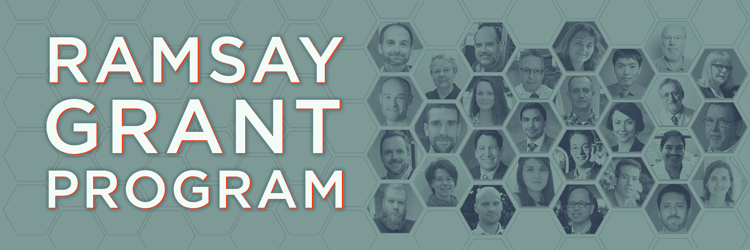
The Ramsay Awards have supported many prominent ME/CFS researchers.
The Solve ME Initiative’s Ramsay Awards play an important role in the ME/CFS research field. Consisting of small grants designed to generate enough data to allow researchers to get bigger grants, they’ve supported many prominent ME/CFS researchers including Jarred Younger, David Systrom, Bhupesh Prusty, Chris Armstrong, Sanjay Shukla, Jonas Blomberg, Lucinda Bateman, Amy Proal and others. Recently, Lissa Selin turned a small Ramsay Award into a rare major multi-million NIH grant for ME/CFS. The Ramsays are definitely an investment well worth making.
Each year’s crop of Ramsay Awards is different. This one was notable in that it suggested that interest in ME/CFS, is, as we hoped it would be, following the advent of long COVID, climbing.
- Increased interest – 130% increase in grant applications
- High Impact Scores – I don’t know how Impact Scores are measured but the fact that this group had the highest potential impact scores of any Ramsay group suggests they’re digging into some pretty hot topics.
- New researchers – the seven awards all went to researchers new to this field. Everyone says this field needs fresh eyes and ears – and here they are – six newbies now digging away at ME/CFS.
- Younger Researchers – Check out their photos – many of these researchers are on the younger side. We want people to build careers out of working on ME/CFS which means getting researchers interested in ME/CFS earlier in their career. Ten years ago, or so Dr. Montoya relayed how his advisor told him something to the effect that working on ME/CFS was a death knell. That’s apparently news to this group.
- Diverse Topics – the wide diversity of research topics isn’t new to the Ramsay’s – they typically award a set of wide-ranging grants but it indicates two things: that while this field has not coalesced around a central theme – it’s a rich field, indeed, with a lot of possibilities presenting themselves.
- Long COVID Focus – Solve ME was smart in supporting 4 grants with long COVID cohorts. The more closely ME/CFS gets linked to long COVID, the better off this field will be.
The 2021 Ramsay Awards
Fixing the Gut-Brain-Connection in ME/CFS?
David Esteban at Vassar College isn’t shy about his new ME/CFS connection at all. In fact, his faculty profile clearly states “I am interested in the role of the gut microbiome in disease (cancer cachexia, and Myalgic Encephalomyelitis/Chronic Fatigue Syndrome)”. (That’s actually a bit unusual). Estaban, who’s also published on viruses is also interested in how communities of bacteria in the gut form and change over time.
Esteban’s ME/CFS study “Microbial aryl hydrocarbon receptor agonists in ME/CFS” is more specific and is headed right at a potentially critical area in ME/CFS and other diseases – the gut-brain axis.
In fact, one study asserts that the aryl receptor Esteban is interested in constitutes “the interface of microbiome-gut-brain axis”; i.e. it’s the major avenue through which the gut communicates with the brain. It does this using tryptophan metabolites which “align gastrointestinal physiology and central nervous system (CNS) function.”
The AhR gut-brain connection is getting more and more interest and is being studied in Alzheimer’s, epilepsy, and other neurological diseases and now … ME/CFS.
It appears that Esteban is going to either assess how this vital pathway is doing in ME/CFS or he’s going to try to improve its functioning. Either would be superb but the second could be exciting indeed as the AhR’s job is to suppress neuroinflammation in the brain. (Talk about a gut-brain connection…).
SEX Matters

Sara Ballouz PhD. will examine the difference gender makes in ME/CFS.
If there’s an issue out there waiting to trip up chronic fatigue syndrome (ME/CFS) researchers it just might be gender. The fact that the number of female ME/CFS (as well as long COVID/fibromyalgia/POTS) patients far outstrips the number of male patients means gender must play a role in this disease yet few researchers attempted to understand how men and women with ME/CFS differ.
Nancy Klimas of the Institute for Neuroimmune Studies is one researcher who has. Eight years ago, she found different immune signatures in men and women with ME/CFS. That year her and Broderick’s modeling efforts again found immune differences and suggested that the male hormone system is protective in ME/CFS but that high estrogen levels can derail the HPA axis in women.
Last year she found significant epigenetic differences in men and women after exercise. This year she found essentially opposite lipid profiles in men and women with ME/CFS. Other research efforts have found differing heart rate variability results.
Finally, when asked about the most eye-opening result from the NIH’s Intramural study, Avindra Nath reported it was the dramatic differences in immune system results between men and women that really popped out for him. The gender issue is a real one.
It was good, therefore, to see the Ramsays take a stab at uncovering the role gender plays in the “Symptoms, mechanisms and sex: Exploring the sex differences in ME/CFS through integrated computational analyses” Ramsay award given to Sara Ballouz, Ph.D. and Anna Liza Kretzschmar, Ph.D.
Pathological Autoantibodies

Aaron Ring MD, PhD. may look young but he has quite a pedigree. He’ll be digging into autoantibodies and ME/CFS.
Aaron Ring, MD, Ph.D. looks like he’s about 20 years old but he has quite a pedigree including degrees from both Yale and Stanford University. The young researcher has stacked up quite a few awards over his ten-year career including a 2020 Young Investigator Award.
Now a professor at Yale, Ring has already participated in several large COVID-19 studies including one, published in Nature, which found that different immune risk factors determined how sick men or women would get after coming down with COVID-19.
Ring will be focusing on autoantibodies – antibodies that mistakenly attack our tissues in his grant. A deranged immune response that attacks one’s own tissues certainly makes sense given the infectious trigger often seen in ME/CFS (and always seen in long COVID).
Except for the fact that they’re “pathological” [i.e. are harmful], we don’t know which autoantibodies Ring is going after in his study “Discovery of pathological autoantibodies in ME/CFS and post-acute sequelae of SARS-CoV-2 infection“. (Wouldn’t it be interesting if he found similar autoantibodies in both diseases?)
Breathing Better

Heather Edgell PhD. is going to see if improving the breathing in ME/CFS helps.
It’s clear something is going on with the breathing – particularly during exertion – in ME/CFS. Many people have reported that they suffer from a hard-to-explain symptom of shortness of breath.
The research suggests something has indeed gone wrong. Systrom found exercise-induced hyperventilation in a significant subset of people with ME/CFS. Naschitz found that tilt table tests induced the same in a significant portion of ME/CFS/FM patients. Natelson and others have found evidence of the same in the form of low CO2 levels (hypocapnia). (Check out two home hyperventilation tests recommended by Dr. Natelson.)
Just a couple of months ago similar findings also showed up during exercise in long COVID.
Short of solving ME/CFS itself what to do about this breathing problem? Besides being emotionally disturbing breathing provides oxygen to the brain and removes toxins. Any help with that vital process would surely be helpful.
Enter “inspiratory muscle training” or RTM – a respiratory exercise program used to help people with asthma, bronchitis, emphysema, stroke, etc. breathe better. Athletes also use RTM to improve their performance. For the first time, it’s going to be tested in people with ME/CFS.
Heather Edgell, Ph.D. is going to use her Ramsay Grant Award to determine if inspiratory muscle training can help people with ME/CFS and/or long COVID think better and improve their physiological functioning. While this approach won’t cure ME/CFS it could certainly improve functioning and reduce suffering – and who doesn’t want that?
Leaky Brains?

Alon Friedman MD, PhD. is going to see if bad things are leaking into ME/CFS patients’ brains.
Sometimes it feels like somebody has taken over our brains and maybe something has. This brain barrier permeability study surely makes sense. We know, after all, that gut permeability is present in some people with ME/CFS. Systrom’s invasive CPET studies make it pretty clear that blood vessel permeability/leakage is going on in some people with ME/CFS as well. So why not the blood-barrier as well.
The potential for mischief is great. Any immune cells or pathogens that get past the BBB are going to cause some big trouble – which makes it kind of surprising that no one, until now, to my knowledge has looked at it yet.
Alon Friedman’s “Blood-brain barrier imaging as a biomarker for ME/CFS” study could also be a perfect fit for Jarred Younger’s study that’s following immune cells from the body to see if they end up in the brain. Finding that immune cells are getting into the brain and demonstrating that the BBB has some leaks could be a powerful combination.
One wonders if Friedman, a German researcher, has made his way to ME/CFS via Carmen Scheibenbogen’s increasingly large German group. Friedman is an established researcher who’s won a bevy of awards over time. It’s good to have him digging into ME/CFS.

Jennifer Stone will use the You+ME Patient Registry to ask “Are long COVID and ME/CFS different?”
The Stupski Awards – Cementing the Long COVID / ME/CFS Connection
The Stupski Awards give researchers the opportunity to generate insights into the 5346-person strong (and growing) You+M.E. Patient Registry.
Australian epidemiologist Jennifer Stone’s study “ME/CFS and Long Covid: Are they the same condition?” will compare the clinical and demographic characteristics of the quite robust number of long COVID patients in the registry (n=934) to people with ME/CFS (n=3945). Do the symptoms differ? How about the type of onset? Does that affect symptom severity? Do people with gradual onset look different from people with infectious onset, etc. and on and on.

Efthymios Kalafatis will see if treatment effectiveness differs between long COVID and ME/CFS
Efthymios Kalafatis a data mining expert, whose skills are touted loudly by others in his LinkedIn profile, is going to use machine learning and textual analysis to determine just how closely ME/CFS and long COVID are linked. Besides assessing symptoms, Kalafatis is going to assess if treatment results are different, how life events are affecting both cohorts, how the two conditions change over time, and others.
Anything that links ME/CFS more closely to long COVID and the immense amount of funding long COVID is getting has the potential to be useful. In fact, cementing that link may be the most important thing any researcher could do – which is probably why four of the seven Ramsay/Stupski awards include long COVID patients.






Regenerative medicine will be the way out of this.
Crispr to cripple or destroy latent viruses like ebv.
Stem cell and crispr to repair the damage, change our tissues.
All of this is great, don’t get me wrong, anything to stop even a tenth of the suffering will be great
Hello CORT,
My symptoms started with kind of like a flu after a severe stress event and having all four of my silver fillings in the back molars removed improperly in 1986. It’s been an uphill climb and sort of a hellish life due to the symptomatology that affects everything especially the neurological system.
All the best and keep up the good work,
Kathleen
We’re both on a kind of similar timeline with ME/CFS. I came down with in the early 80’s. Congratulations on being able to survive financially despite all of it.
That combination of stress and the filling issue makes me think of the IBS study which found that an infection in conjunction with another stressor (a dietary one) was what did it. If I remember correctly something similar occurs in complex regional pain syndrome (CRPS) where it takes an infection and a cut to start it off.
I recently started taking Ivermectin for a skin infection and found that my fatigue and brain fog from ME/CFS improved. I’m wondering if anyone else has experienced this.
I appreciate your reporting very much and the work you do. But PhD of the tousled hair (Sara Ballouz)? Seems a bit demeaning and sexist. Just saying.
Came here to say the same thing.
I’m sure there’s no harm intended, Cort, but can I please ask that you omit all references to researchers’ physical appearances?
How anyone looks has no bearing on their ability to conduct research.
Fingers crossed for all of these projects and thanks for keeping us updated!
Thanks Mary, I do want you to know that I’ve occasionally made what I thought were somewhat humorous comments about men’s appearance – including in this blog regarding one of the male researchers’ very young appearance – as well as Lenny Jason’s bald pate and things like that.
I don’t want to offend anyone – or detract from the main purpose of the blog -which was to inform the community about these new efforts. Thanks for cluing me in. I’ve fixed that comment and will bear in mind your input in the future. (I’m sure you speak for others :). Thanks for letting me know.
I hope the researcher wasn’t offended – I like that look. In fact, I’m a proud member – I would even say a leader of the tousled hair club, myself :).
Thanks K. Mary was indeed speaking for others as well. :). I promise you I got the message!
Hi Cort,
Thanks for changing that. Could you also remove the references to Aaron Ring’s appearance as well?
I understand your intention was to be humorous, but making reference to anyone’s physical appearance (regardless of gender) undermines how seriously we all take this important research.
Thank you for being open to my feedback on this, as well as Mary’s.
I appreciate your thoughts but think I’m going to keep that K. I don’t think men’s appearances are scrutinized nearly as much as are women’s and it’s not as much of an issue with them. I tried to make sure that despite his youthful appearance he is clearly an experienced researcher who’s on quite an upward career path.
I hope it doesn’t detract too much from the seriousness of the subject. Personally, I like to keep as much of an easygoing conversational style as I can. That makes writing the blogs more enjoyable for me and hopefully it enhances readability without turning off too many people.
Not to pile on, but I read this and then couldn’t get it out of my mind, so I guess I feel strongly enough that I felt I needed to chime in. I understand your wanting to keep things light, lord knows we all really need a sense of humor to help us deal with ME, but I don’t think people’s physical attributes are fair game.
So much of what you write shows what a thoughtful, well-intentioned, and kind person you are. In that spirit, could you please rethink your stated idea that it’s okay to dis on men? You don’t really know how anyone feels about their appearance.
As far as keeping the blog conversational, perhaps best not to write anything you wouldn’t say to that person if they were standing in front of you 🙂
I enjoyed this blog post and I’m grateful to these researchers!
My docs are at two bay area teaching hospitals. I’ve noticed since covid that young resident physicians ask questions about me/cfs and my symptoms in spite of their older attending’s historically avoiding the subject or in some instances telling me they don’t want to hear about me/cfs. This openness is welcome and long overdue.
That is such good news Anne and thanks for sharing it. That jives with the increased interest the Ramsay Awards received this year. Let’s hope the long COVID’s rising tide indeed floats all boats. I think it will.
Thanks again for a wonderful article. In this article you link to your “A Home (Postural Hypocapnic) Hyperventilation Test” page. On that page I think there is an important typo. It says that when breathing into the bag if you symptoms “appear”, I think it should say “don’t appear”. Or am I missing something.
Whoops. That’s a very big error! My apologies and thanks to you for pointing that out. (It also gave me the opportunity to fix some rather glaring grammatical issues.)
Has any study been done to link the chloramines in our drinking water to gut issues etc.? The last couple of years the chlorine is so strong it smells like burnt chlorine coming out of our fawcets! Awful. Mentioned it a couple weeks ago about the heavy chlorine levels in our tap water in a docs office and it was suggested to get a pool test kit (we don’t have a pool so I hadn’t thought of that). Sure enough hubbie tested our fawcet water and the strip tested high chlorine. Our area uses chloramines. Read this not at all good. Changed to bottled water for cooking and coffee and odd enough, some of my brain fog is being replaced by more clarity. Connection? Excessive chloramines in some areas could be confusing and exacerbating symptoms in some of us, especially if we are chloramine sensitive……
Ty for mentioning that link – have had M.E. For 20 years, and lately I feel like I may suffocate when I lower my head to sleep.Ty will go read now, since it’s frightening, and creates much anxiety!
Re: “Any immune cells or pathogens that get past the BBB are going to cause some big trouble – which makes it kind of surprising that no one, until now, to my knowledge has looked at it yet.”
the findings of Dr. Alan Macdonald–who was a hospital pathologist–where he found not only nematodes, eggs, and nematode fecal matter in brain slices; as well as frank visible nematodes in spinal fluid; as well as showing through very specific genetic fluorescent primers, that there were spirochetes associated with the plaques in Alzheimers, says to me that insults to the brain can cause bad things, and his work is of importance for me/cfs researchers to read and investigate.
https://m.youtube.com/watch?v=EHVXJpDBcmU
https://www.google.ca/amp/outbreaknewstoday.com/lyme-discovery-borrelia-bacteria-hides-inside-parasitic-worms-causing-chronic-brain-diseases-13216/%3famp=1
https://alzheimerborreliosis.net/
https://f1000research.com/posters/9-1062
Thanks Sunie. I was just reading about an NIH funding which suggested that a cancer drug may be helpful in Alzheimer’s. What piqued my interest was that the drug may be helpful in reducing neuroinflammation. tau phosphorylation and amyloid secretion. I have no idea if the protein the drug is attacking has anything to do with ME/CFS but it appears that neuroinflammation is present and some studies have even suggested that amyloid and tau phosphorylation are affected.
https://www.nih.gov/news-events/news-releases/repurposed-cancer-treatments-could-be-potential-alzheimers-drugs
Who knows what research into other central nervous system diseases will provide for diseases like ME/CFS?
Thank for the link, Cort!
and Dr. Anna Coghill
“those with larger amounts of T. gondii antibodies, meaning they had been exposed to the parasite at some point, appeared to have a higher risk of developing glioma.”
https://moffitt.org/endeavor/archive/parasite-in-undercooked-food-may-be-linked-to-brain-cancer/
Rapid but massive changes in gut microbiome in COVID that seems to persist in long Covid patients.
Am quite interested in the breathing issue as that was the first thing that got my daughter’s attention in 1997 when she became ill. She was a dancer who was dancing at least a couple of hours a day and suddenly she felt like she couldn’t breathe. All these years later, she is restricted in various ways with the breathing problems and has been to the hospital at least once with severe problem with no seeming cause. After reading her test results from the hospital, I advised her next time to try the breathing into the paper bag method before resorting to the E.R.
Try buteyko. It’s a systematic way to control your breathing . It works on a few levels. Keeping calm by monitoring your breathing but also improving oxygen by increasing the amount of co2 . Seems paradoxical but you need carbon dioxide to offload oxygen into tissue..otherwise you just have oxygen not getting into vital tissue. That’s why people breath into bags. Buteyko is a systematic way of learning to rebreath
Hi Peggy!
Biology of living organisms 10:
O2 in + sugar –> CO2 out + heat
In human terms, heat = temperature.
Metabolism and thyroid function.
Ha! It ate the 101:
Biology 101
Friedman does not seem to be based in Germany but born in Israel and currently based in Canada. Maybe one time you can do one of your interesting pieces on origin stories for these scientists to become involved into the field of ME/CFS, where their contribution is very welcome!
No kidding! Some really interesting stories out there 🙂
Regarding breathing, check out the Buteyko method. Would be nice if you wrote about it :). A better way to measure for chronic hyperventilation or hypocapnia is the Control Pause test from the Buteyko method. Really, everyone with CFS should test it: it’s free, easy and quick and you can’t heal if your control pause remains low, because then you are not treating the main cause or at least one of the big ones.
Breathing into a bag is not a good test: if your control pause/CO2 is very low then you are also very sensitive to changes in CO2, so breathing into a bag will make you hyperventilate instead of calm down.
There was also a research into Buteyko showing low control pause meant bad spirometry results* (FEV1or FVC 15% below predicted), so maybe respiratory muscle training is useful? Powerlung seems like the best (trains inspiration and expiration), Powerbreathe second best (only trains inspiration) (both work with a valve and a spring, not holes in different sizes)
*https://www.academia.edu/29430464/Investigating_the_Claims_of_Konstantin_Buteyko_M_D_Ph_D_The_Relationship_of_Breath_Holding_Time_to_End_Tidal_CO_2_and_Other_Proposed_Measures_of_Dysfunctional_Breathing
PS: the research article says there’s no relation between ETCO2 and control pause, to which this Buteyko expert had this to say: https://www.normalbreathing.com/etco2-capnography/